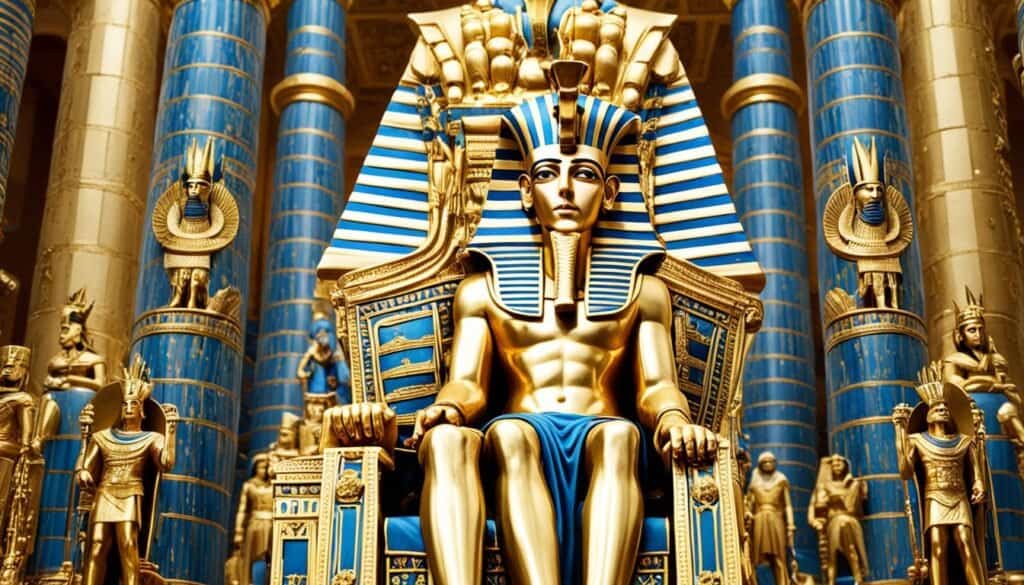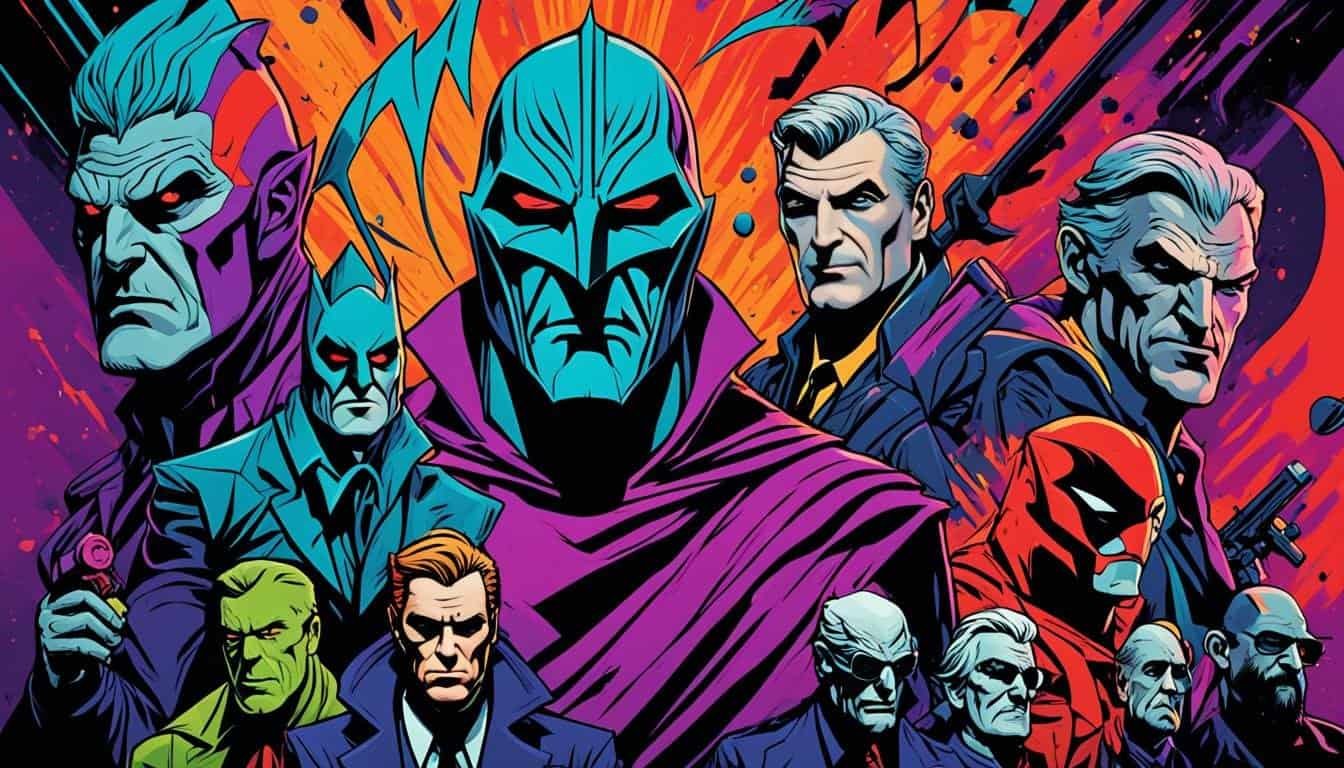In Genesis, we find stories of deceit, envy, and defiance. The cunning snake in the Garden of Eden and Sodom’s evil people are memorable villains. They influenced the path of human history significantly. Let’s explore who they were and the lessons their stories teach us.
We’ll look at the tales of 10 notorious villains in Genesis. We’ll uncover the reasons behind their actions. Stories range from Cain’s first murder to the Egyptian Pharaoh’s deceit. Each story shows themes like sin, moral choices, and justice.
Ready to look deeper into the dark side of biblical history? It’s a journey worth taking together. Let’s get started.
Key Takeaways:
- Genesis tells the stories of 10 unforgettable villain characters.
- These stories highlight themes of deceit, envy, and defiance.
- Exploring these stories teaches us about human nature and moral decisions.
- Villains in Genesis warn us of the dangers of sin and rebellion.
- Studying these narratives helps us understand the importance of faith and humility in facing life’s trials.
The Serpent – The Deceiver
In Genesis, the serpent is a well-known bad character. Many see it as a symbol of evil, like the devil. It’s famous for tricking Eve into eating the forbidden fruit. This led to the big ‘fall of man’ story.
The serpent told Eve that eating the fruit would make her wise like God. Eve was fooled by this and ate the fruit. She gave some to Adam, and he ate it too.
This story changed everything for humanity. They went from being innocent to knowing good and evil. This was against what God had told them. It marked the beginning of sin.
“And when the woman saw that the tree was good for food, and that it was pleasant to the eyes, and a tree to be desired to make one wise, she took of the fruit thereof, and did eat, and gave also unto her husband with her; and he did eat.” – Genesis 3:6
Their choice stands as a warning for everyone. It shows the bad things that can happen when we don’t obey and are tempted. The serpent’s trickery reminds us to be careful and hold onto our faith.
The Forbidden Fruit: A Test of Obedience
https://www.youtube.com/watch?v=uP7Wvv-VEcw
The forbidden fruit is often thought to be an apple. It represents the first sin in the Bible. By eating it, Adam and Eve broke God’s rule and brought sin into the world.
This story warns us about temptation. We face it every day, just like Eve did. It’s a test of our faith and willingness to obey God.
As we think about the serpent and the fruit, let’s not forget to be careful. By staying strong in our faith, we can say no to temptation and stay true to God.
Cain – The First Murderer
Cain is remembered as one of the most notorious figures in the Bible. He was the first murderer, killing his brother Abel. This act was driven by overwhelming jealousy and uncontrolled anger.
The story of Cain and Abel highlights the dangers of unchecked emotions. Cain was jealous because God liked Abel’s offering more. This jealousy led him to murder.
And the Lord said to Cain, “Why are you angry, and why has your face fallen? If you do well, will you not be accepted? And if you do not do well, sin is crouching at the door. Its desire is contrary to you, but you must rule over it.” – Genesis 4:6-7
Cain’s act of killing his brother teaches us about the impact of jealousy and anger. Jealousy and anger not only destroyed his own life but also separated him from God.
The story of Cain urges us to control our emotions. It shows the dangers of not managing jealousy and anger. This lesson remains relevant today.
We should learn from Cain’s mistake. Let’s work on understanding and managing our negative feelings. This way, we can avoid the harm they can cause.
| Lessons from Cain – The First Murderer |
|---|
| Unchecked jealousy and anger can lead to destructive actions. |
| Managing emotions is crucial for maintaining healthy relationships. |
| Addressing the root causes of negative emotions is essential for personal growth. |
Lamech – The Boastful Polygamist
Lamech was from Cain’s line. He was famous for his pride and having many wives. His behavior and words show how violence and sin were growing in his time.
Lamech’s worst deed was bragging about killing. He said he killed a man for hurting him and a boy for hitting him. With a lot of pride, he spoke to his wives:
“Lamech said to his wives, ‘Adah and Zillah, hear my voice; you wives of Lamech, listen to what I say: I have killed a man for wounding me, a young man for striking me. If Cain’s revenge is sevenfold, then Lamech’s is seventy-sevenfold.'”
His boastful story isn’t just about his arrogance and anger. It reflects a society that was becoming more dark and violent.
In a world where crime and sin were rising, Lamech’s story is a warning. It shows the terrible result of pride, violence, and wrong ideas about power.
Escalating Violence and Sin
Lamech’s bragging shows how bad things had become in Genesis. It’s a sign of a society that was forgetting values and even praised violence.
The effects of what Lamech did were shocking. It showed how far people could fall into evil. Violence twisted right and wrong, leading to a very dark place.
This sad story in Genesis teaches us a lot. It’s a warning against too much pride, violence, and sin. This message is timeless, reminding us of the ongoing fight for doing what’s right.

Next, let’s explore other memorable villains in Genesis. We’ll see how they impacted the bible’s history. And, learn important lessons about human nature and our spiritual journey.
The People of the Tower of Babel – Arrogant Builders
In the book of Genesis, we discover the Tower of Babel people. They were eager to build a tower to the skies. Their goal was a sign of pride and a direct challenge to God’s orders. God had told them to spread out over the land.
Building the tower showed they wanted to be strong and unique. They thought if they could get to heaven, they would be like gods. But their wrong thinking led to a bad ending.
Because of their disobedience, God mixed up their languages. This made the people move far and wide, not understanding each other. They started living in different places and had to deal with new languages they couldn’t speak. This event was to stop them from being too proud and rebellious.
“And the Lord said, ‘Behold, the people are one, and they have all one language, and this they begin to do: and now nothing will be restrained from them, which they have imagined to do. Go to, let us go down, and there confound their language, that they may not understand one another’s speech.'” – Genesis 11:6-7
The tale of the Tower of Babel people teaches us to be humble and not challenge God. It’s a story about being obedient and not trying to outsmart God’s rules.
Would you like to see the people’s dream of touching the sky in this image?
The People of Sodom – The Wicked Inhabitants
The people of Sodom were famous for their evil ways. They did things that angered God. Their city was filled with pride, greed, and they were very unwelcoming. Because of their wickedness, they faced a terrible end, destroyed by fire from the sky.
This tale warns us about the dangers of living wrongly. It highlights the need for goodness, caring, and being kind towards others. These are values we should always follow.
“But the wicked inhabitants of Sodom were consumed by their sinful desires, their hearts hardened against righteousness. And so, they brought upon themselves their own destruction, the fiery wrath of God.”
We should remember the fate of Sodom’s people. It shows us the importance of being good and kind in our own lives. Let’s choose a path of love, goodness, and forgiveness over evil.
The Consequences of Wickedness
The end of Sodom sends a strong message about the dangers of sin. It tells us to always strive to be fair and morally upright. Without doing so, we risk great harm.
Let’s look deeper into the sins that doomed Sodom. Let’s see why their actions led to their destruction:
- Pride: The people of Sodom thought they were better than everyone else. They held a deep arrogance.
- Greed: They were very focused on money and what they could get for themselves. They cared little for others.
- Lack of Hospitality: Even though they were wealthy, they didn’t help outsiders. They were not hospitable at all.
These sins, and others like them, created an environment of evil. This environment was the reason for their city’s downfall.
The Warning
The story of Sodom is a powerful warning against sin. It warns us of the punishment for living in a bad way. We should aim for goodness and work towards a community of fairness, love, and mercy.

Pharaoh of Egypt – The Oppressive Ruler
In the story of Abram, Egypt’s Pharaoh is seen as a bad guy. He takes Sarai, who is Abram’s wife, into his home through deceit. This harms their marriage and shows how Pharaoh uses his power wrongly.
Yet, Pharaoh doesn’t get away with what he did. God steps in and sends troubles to Pharaoh and his household. This makes Pharaoh let Sarai go and return her to Abram. It shows that those who misuse their power will be punished.

Pharaoh’s Plague
“And the LORD plagued Pharaoh and his house with great plagues because of Sarai, Abram’s wife.” – Genesis 12:17
The tale of Sarai and Pharaoh teaches us to always act with honesty and treat others well, no matter our role. It warns against using power for selfish reasons. And it highlights the harm that comes when leaders betray the trust placed in them.
Abimelech – The King Misled by Abraham
Abraham’s journey brought him face to face with many rulers. One of them was Abimelech. Abimelech mistakenly thought Sarah was Abraham’s sister and took her. This led to tension and conflict.
But, God stepped in to stop a disaster. He warned Abimelech in a dream not to keep Sarah. God told him she was Abraham’s wife. Abimelech, afraid of God’s punishment, gave Sarah back immediately, trying to fix his wrong.
The story of Abimelech and Abraham highlights tricky parts of relationships and deceit’s fallout. Abimelech, acting without knowing the full truth, could make things right thanks to God’s direct help.
“And God said to him in the dream, ‘Yes, I know that you did this in the integrity of your heart, and it was I who kept you from sinning against me. Therefore I did not let you touch her. Now then, return the man’s wife, for he is a prophet, so that he will pray for you, and you shall live.'” – Genesis 20:6-7 (ESV)
Abimelech’s humility showed his true character. Once he knew the truth, he acted quickly. He confessed his mistake, sought to make amends with God and Abraham. This saved him from a punishment he might have faced.
This tale is about doing the right thing, even if we make a mistake. It shows how important it is to have integrity. And it tells us that it’s always possible to make up for our mistakes and earn forgiveness.

| Abimelech’s Error | Divine Intervention | Abimelech’s Response |
|---|---|---|
| Taking Sarah as his own, believing she was Abraham’s sister | God warned Abimelech in a dream about the consequences | Abimelech immediately returned Sarah to Abraham |
| Acting out of ignorance | God acknowledged Abimelech’s integrity | Abimelech sought reconciliation with both God and Abraham |
Laban – The Deceitful Father-in-Law
In Genesis, Laban is a key, deceptive figure impacting Jacob’s story. As Jacob’s father-in-law, Laban’s deceit and manipulation strain their relationship.
Jacob wanted to marry Rachel, Laban’s younger daughter. But, Laban tricked Jacob by marrying him to Leah, Rachel’s older sister, instead. This deceit led to a tangled emotional situation.
Laban’s trickery continued during Jacob’s work for him. He changed Jacob’s wages many times to benefit himself. This left Jacob feeling frustrated and disrespected.
“I have learned by experience that the LORD has blessed me because of you.” – Genesis 30:27 (NLT)
Despite their tumult, Laban and Jacob made a peace agreement. Yet, the memory of Laban’s deceit lingered, impacting their relationship for years.
| Laban’s Actions | Result |
|---|---|
| Tricks Jacob into marrying Leah instead of Rachel | Jacob unknowingly marries Leah and is left in a complicated marriage situation |
| Constantly changes Jacob’s wages | Jacob experiences frustration and disrespect |
| Reaches a temporary covenant with Jacob | A resolution is achieved, but the strained relationship remains |
In Genesis, Laban embodies a deceitful father-in-law. His actions set a cautionary tale for family relationships, showcasing the damage deceit can cause.
Related Characters:
- Jacob – The deceived son-in-law.
- Rachel and Leah – Laban’s daughters, caught in the web of deception.
- Rebekah – Laban’s sister and mother of Jacob, central to the deceit involving Jacob’s marriage.
Esau – The Wronged Brother
Esau is known as Jacob’s older twin. They play major roles in Genesis. Their story starts with Jacob taking Esau’s birthright blessing unfairly.
Jacob tricks their father Isaac into giving him the blessing meant for Esau. This leaves Esau feeling angry and betrayed. He wants revenge.
“‘When the days of mourning for my father are over, I will kill my brother Jacob.'”
Esau is furious and promises to kill Jacob as soon as their father dies. This promise marks the beginning of a difficult time between them. It leads to a long period of separation and suffering but, later, they find peace.
The story warns about the danger of not valuing what is rightfully yours. It shows how resentment causes a big gap between loved ones. And it tells how seeking revenge can bring sorrow more than justice.
The tale of Esau and Jacob is also about forgiveness. After many years, the brothers forgive each other and truly reconnect.
A Story of Reconciliation and Redemption
The ending where Esau welcomes Jacob back is a powerful moment of forgiveness and healing. Instead of vengeance, Esau shows love.
This act opens a new chapter for the brothers, where peace replaces anger. It’s a story about the life-changing act of forgiving. And how it’s always possible to make up after being deeply hurt.
How Do Vivid Word Pictures in Genesis Enhance the Portrayal of Villain Characters?
Exploring vivid imagery in genesis text creates a powerful backdrop for villain characters, allowing their malevolence to unfold dramatically. Detailed descriptions evoke emotions and set the tone, making characters like Cain and the serpent unforgettable. These images shape our understanding of their motivations, deepening the complexity of their roles in biblical narratives.
Potiphar’s Wife – The False Accuser
Potiphar’s wife is a key figure in Genesis. She falsely accuses Joseph, her husband’s servant, of trying to assault her. This lie gets Joseph put in prison but is a crucial step in his journey to power in Egypt.
This tale warns of the harm from false claims. Joseph, falsely accused, stays strong and faithful. He’s a model of resilience in tough times.
Though wrongly imprisoned, Joseph never wavers. He gains fame for his wisdom and dream-interpretation. This shows Joseph’s strong spirit and loyalty to God, even when facing lies.
Affiliate Disclosure: "As an Amazon Associate I earn from qualifying purchases made from links in this post. We are a participant in the Amazon Services LLC Associates Program, an affiliate advertising program designed to provide a means for us to earn fees by linking to Amazon.com."

